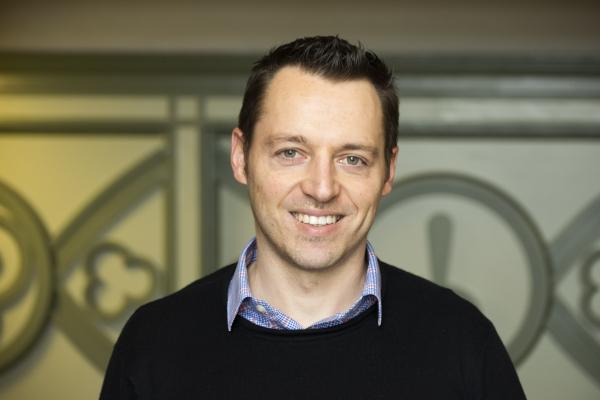
NIH and TRISH grant recipient Jacek Dmochowski, a biomedical engineering professor at CCNY's Grove School of Engineering.
The City College of New York’s biomedical engineering professor Jacek Dmochowski uses ultrasound and lasers to stimulate the brain treating mental disorders as well as physical and mental wellness during deep space exploration missions. His research just got a boost from the National Institutes of Health’s Brain Research Advancing Innovative Neurotechnologies (BRAIN) Initiative and the Translational Research Institute for Space Health, in partnership with NASA.
“The brain is sensitive to mechanical forces, and we think that we will be able to make the brain more or less active by sending in a wave of ultrasound applied to the head,” said Dmochowski about his NIH grant. “In particular, we are interested in altering the pattern of brain waves that have been shown to be modified during disorders such as schizophrenia, depression, and obsessive-compulsive disorder.”
By changing the abnormal patterns of brain oscillations through ultrasound, it will treat the symptoms and potentially the root of the disease. The major advantage of brain stimulation versus medication is that it can be applied just to one area of the brain, as opposed to drugs, which are generally taken orally and then delivered to all parts of the nervous system, causing unwanted side effects.
His mentor Elisa Konofagou, a professor of biomedical engineering at Columbia University, oversees Dmochowski during the two-year NIH grant. As a junior investigator, Dmochowski will benefit from Konofagou, whose expertise is in ultrasound. The grant is for $300,000.
Dmochowski’s two-year TRISH grant will allow him to test the possibility of using lasers to increase energy metabolism in the brain. By stimulating the brain with lasers, it will accelerate energy metabolism and enhance cognitive function in spaceflight for astronauts. The grant is for $800,000.
“All cells, including those in the brain, require energy in the form of ATP to carry out essential functions,” said Dmochowski. “This is an important problem during deep space missions, which last 18-24 months, because a number of negative health consequences, including those affecting cognition, have been reported.”
About The City College of New York
Since 1847, The City College of New York has provided a high quality and affordable education to generations of New Yorkers in a wide variety of disciplines. CCNY embraces its role at the forefront of social change. It is ranked #1 by the Harvard-based Opportunity Insights out of 369 selective public colleges in the United States on the overall mobility index. This measure reflects both access and outcomes, representing the likelihood that a student at CCNY can move up two or more income quintiles. In addition, the Center for World University Rankings places CCNY in the top 1.2% of universities worldwide in terms of academic excellence. More than 16,000 students pursue undergraduate and graduate degrees in eight professional schools and divisions, driven by significant funded research, creativity and scholarship. CCNY is as diverse, dynamic and visionary as New York City itself. View CCNY Media Kit.
Ashley Arocho
p: 212.650.6460
e:
//aarocho@ccny.cuny.edu
/">
aarocho@ccny.cuny.edu
View CCNY Media Kit